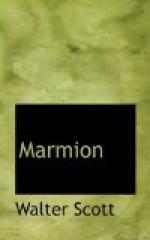line 137. Blood-gouts, spots of blood. Cp. ‘gouts of blood,’ Macbeth, ii. I. 46.
line 150. Shakespeare, King John, iv. 2. 13, makes Salisbury say that—
’To smooth the
ice, or add another hue
Unto the rainbow,
or with taper-light
To seek the beauteous
eye of heaven to garnish
Is wasteful, and
ridiculous excess.’
Stanza vi. line 174. Beadsman, one hired to pray for another. Cp. ‘Piers the Plowman,’ B, iii. 40:—
’I shal assoille
the my-selue . for a seme of whete,
And also be thi
BEDEMAN.’
Edie Ochiltree, the Blue-gown in ‘The Antiquary,’ belongs to the class called King’s Bedesmen, ’an order of paupers to whom the kings of Scotland were in the custom of distributing a certain alms, in conformity with the ordinances of the Catholic Church, and who were expected in return to pray for the royal welfare and that of the state.’ See Introd. to the novel. Cp. also Henry V, iv. I. 315:—
‘Five hundred poor I have in yearly pay,’ &c.
Stanza vii. line 218. The Palmer’s dress is put off like the serpent’s slough. Cp. the Earl of Surrey’s Spring sonnet—
‘The adder all her slough away she flings.’
Stanza VIII. line 261. Featly, cleverly, dexterously. Cp. Tempest, i. 2. 380:—
‘Foot it featly here and there.’
Stanza ix. line 271. See Otterbourne, ‘Border Minstrelsy,’ i. p. 345. Douglas’s death, during the battle was kept secret, so that when his men conquered, as if still under his command, the old prophecy was fulfilled that a dead Douglas should, win the field.
line 280. James encamped in Twisel glen (local spelling ‘Twizel’) before taking post on Flodden.
line 282. The squire’s final act of qualification for knighthood was to watch by his armour till midnight. In his Essay on ‘Chivalry’ Scott says: ’The candidates watched their arms all night in a church or chapel, and prepared for the honour to be conferred on them by vigil, fast, and prayer.’ For a hasty and picturesque ceremony of knighthood see Scott’s ‘Halidon Hill,’ I. ii.
Stanza xi. With the moonlight scene opening this stanza, cp. ’Lay of Last Minstrel,’ ii. i. Scott is fond of moonlight effects, and he always succeeds with them. See e.g. a passage in ‘Woodstock,’ chap. xix, beginning ’There is, I know not why, something peculiarly pleasing to the imagination in contemplating the Queen of Night,’ &c.
line 327. ’The well-known Gawain Douglas, Bishop of Dunkeld, son of Archibald Bell-the-Cat, Earl of Angus. He was author of a Scottish metrical version of the “AEneid,” and of many other poetical pieces of great merit. He had not at this period attained the mitre.’— Scott.




